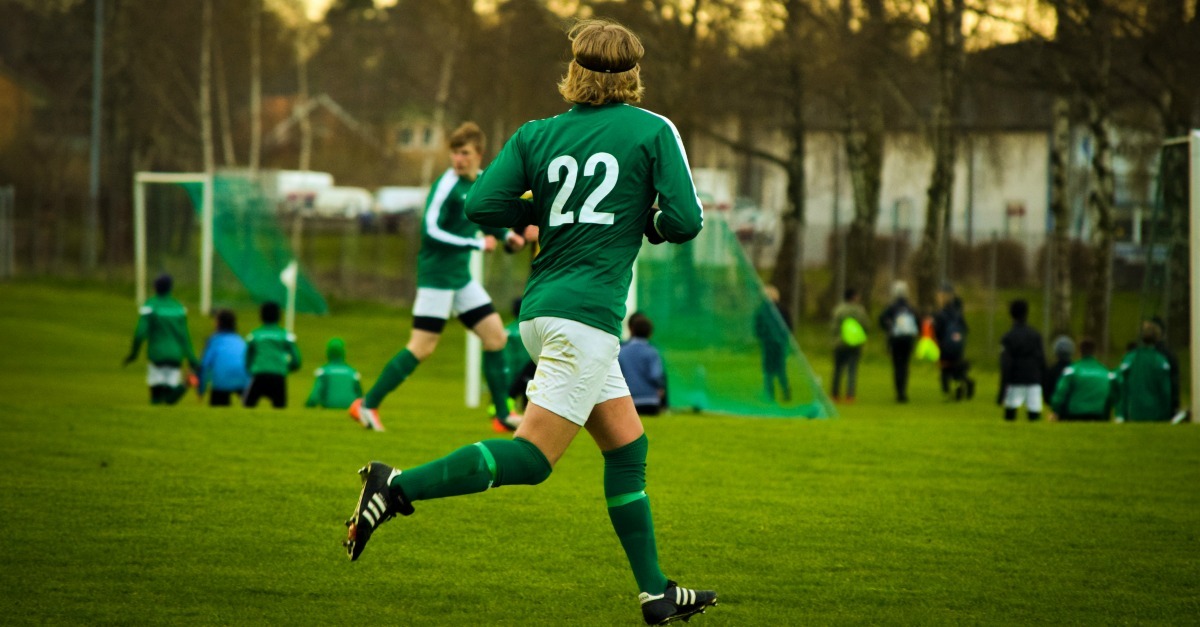The alarm goes off early Monday morning.
It’s dark. There’s still a chill in the air. Hitting the snooze button would be so easy…
Instead, my husband and I roll out of bed. One of us heads to make coffee, and the other starts the process of getting our teen son to wake up before the sun rises.
He’ll eventually stagger out of his bedroom in his soccer gear, grab a protein bar, and head for the car. My husband will drive him to his before-school training session while I get our younger one ready for school. After dropping her off, I’ll pick him up and get him to school.
This is our routine three days a week, with night practices the other days, which can run anywhere from an hour and a half to three hours.
Yes, it changes. Sometimes with less than 24 hours’ notice.
What do the weekends look like for youth sports families?
There is ALWAYS a game on the weekend–to have just one feels like a vacation.
Most of the time, the games are a few hours drive from our home or maybe even a plane ride for a big tournament. There are months we spend more weekends in hotels than our own house.
Although we did not plan it this way, our son became a single sport athlete, which means year-round training and some sacrifices of his free time.
Beyond those who are a part of this world with us, most everyone else thinks we’re crazy.
Sometimes I agree.
And I won’t lie this is NOT the life I envisioned when we first started our family.
Related: It’s Hard to Imagine What Your Life Will Look Like After Youth Sports Ends
Competitive youth sports has its ups and downs
Yes, I have a love/hate relationship with our family’s involvement in competitive soccer.
I am not for one minute going to tell you that I’m totally okay with what is going on in youth sports today. There is, without a doubt, more drama happening in kids’ athletics than you’ll ever find on an episode of “The Housewives of [Wherever].”
The amount of time families are asked to commit can be unfair and stressful. The money that is required for everything from general fees to travel expenses and private training is out of control.
There are many “professionals” who are not looking out for our young athletes, and therefore there is a higher incidence of overuse injuries, mental health problems such as anxiety and depression, and burnout.
I also think too many parents are focused on the rare occurrence of their child achieving an athletic scholarship instead of playing for the love of the games–and the lessons they can learn.
For all these reasons, my son’s involvement with competitive soccer is a constant struggle in our household. I hear the same from his peers and parents who are competing in other sports, such as gymnastics, baseball, hockey, etc.
Competitive youth sports participation means parents can’t lose control of their family principles
Knowing that a good portion of my son’s adolescence would be tied up in his sport, we knew we had to set some ground rules. This is why my husband and I try to be diligent about managing soccer in a way that is as healthy as possible for our son and our family.
We set some rules in place to ensure our son’s well-being and our family unit would remain strong.
A few of our rules include:
1. Family ALWAYS comes before soccer.
If a major family event or commitment conflicts with a soccer game or practice, then we don’t go to soccer. This is hard but worth it. We need to remind our young athletes what is truly important in life, and that is being there for the ones we love. Sure, sometimes we come a little late or need to leave a little early, but we always try to show up.
2. We DO NOT sacrifice our younger child’s life for her brother’s involvement in soccer.
While we want her to learn to support her brother, it is not right to ask her to spend her life on the soccer field. This means that sometimes we need to pick and choose who goes to what and allowing her the option to say that she doesn’t want to attend.
3. School comes first – THE END!
If homework is not done, then there is no practice, or a game will be missed. My son also knows that if his grades fall below an acceptable level at any point, he will no longer get to play soccer at the competitive level. As young teens become high school athletes, this becomes even more important. A good coach will be checking grades and ensuring their students do not fall off track.
4. Soccer should be fun, and at the point it stops being fun, then it’s time to move on. This one is so important. So often parents don’t want their kid to give up on all the hard work they’ve put in, but the truth is, sometimes teens figure out that they’re just not enjoying it anymore. It’s so important to listen to them and watch their behavior.
Related: These Are the Mistakes I Made That Caused My Daughter to Quit Sports
We live by these rules because we know that with youth competitive sports, there needs to be boundaries.
However, we also know, that no matter how others may condemn our choices, we need to feel comfortable with our choices.
There are many benefits to competitive youth sports
Our son is a child who stood up and ran, not walked, at nine months old.
He made other parents of highly active children look at us with pity. He is never happier than when he is on the move and constantly stimulated.
I know without a doubt that participating in soccer at an early age gave him an outlet for all that energy that otherwise would have undermined him academically and socially.
We also believe that competing in a sport has helped him develop discipline, a strong work ethic, coping skills, character, self-confidence and resiliency. Things don’t always go perfectly on the field, and he has learned a lot of life lessons about dealing with tough losses, injuries, and overcoming obstacles.
He also learned about teamwork and getting along with others. Figuring out how to get along with challenging people, navigate different coaching styles, and develop some leadership skills has helped him become successful in other areas of his life.
Most importantly, he just really loves the sport!
Another added benefit is the close friendships we’ve made with other families that we wouldn’t have met if it wasn’t for soccer
But most importantly, not only our son, but his father, his sister and I have all developed close friendships and found a group of people who are like extended family.
While many people talk about how competitive sports takes away from family time, for us over the years, it has actually provided an abundance of fun family memories.
It is important for youth athletes to be more than just their sport
He has taken music lessons, participated in school clubs, tried other sports at summer camps, and he loves to read. I do periodic health checks to ensure he is on track and happy with where his life is and how he is spending his time.
Not only do we want him to be well-rounded, but we all know how a sports injury or change of heart can occur at any time. We want him to find other hobbies and passions that he loves.
I don’t know where soccer might take him, and I don’t care; that’s not why we do it.
All I know is that soccer makes his eyes shine brighter and his smile bigger and that even when he loses, he still just loves the game.
As long as that remains true, then all the time and money spent is worth it, at least for this crazy soccer mom.
Raising teens and tweens is hard, but you don’t have to do it alone. Here are some other posts parents found helpful:
30+ Inspirational Sports Movies to Connect with Your Teen
Middle School Is Hard for Everyone, But Sports Can Make It a Little Easier








Thank you, this is my life everyday and it’s nice to hear from others they are going through the same craziness. :]